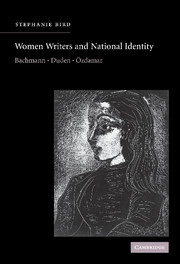Introduction
Published online by Cambridge University Press: 22 September 2009
Summary
Even if it is likely that Euripides was the first dramatist to make Medea murder her children, there are plenty of other murders to her name. She slaughtered her brother and scattered his remains into the Black Sea, she was involved in the murder of Jason's uncle, Pelias, and finally killed Creon and his daughter, Jason's new wife. Yet in Christa Wolf's Medea she is absolved of all these crimes. The narrator, in a brief introductory section, assumes a tone of insistent moral authority, justifying her desire to reopen the secrets of the past by reference to the afflictions of the present: ‘Das Eingeständnis unserer Not, damit müßten wir anfangen’ (9). (We should start with the admission of our distress.) The narrator makes the astonishing assertion that the Ancient Greeks are ‘fremde Gäste, uns gleich’ (9) (strange guests who are like ourselves) and that Medea's age is one which speaks more clearly to us than others. Thus the ‘erwünschte Begegnung’ (desired encounter) with Medea will not only expose how sorely she has been misjudged, a misrepresentation perpetuated by the myths, but will also confront us with our own processes of misjudgement and self-deceit.
There follow eleven dramatic monologues by six characters, which convey how the woman Medea has been made the scapegoat for crimes of the state. Medea discovers that Creon's assertion of power and wealth rests upon the sacrifice of his daughter.
- Type
- Chapter
- Information
- Women Writers and National IdentityBachmann, Duden, Özdamar, pp. 1 - 10Publisher: Cambridge University PressPrint publication year: 2003

